Jacob Sheep are rare breed of small, piebald, polycerate sheep(wikipedia). Ok in that first sentence I learned 2 new words.
Piebald : from wikipedia:”A piebald or pied animal is one that has a spotting pattern of large unpigmented, usually white, areas of hair, feathers, or scales and normally pigmented patches, generally black.”
Polycerate: multihorned
Jacobs may have from two to six horns. I’ve honestly only seen 4 in person. The most common color is black and white. I managed to get some grey and brown. The Jacob is descended from an ancient breed of sheep, although its exact origins remain unclear. Spotted polycerate sheep were documented in England by the mid–17th century, and were widespread a century later. Jacob sheep of North America have not undergone extensive cross-breeding and selective breeding. They look a bit like a goat to me as most more primitive sheep usually do. British Jacobs tend to be larger and heavier, and have lost many of their original characteristics through breeding.
There a couple of theories about the origins of Jacob sheep one of them being the biblical account of Jacob in in Genesis taking all the specked sheep from his uncle’s flock and breeding them. Jacob sheep came from Jacob. This was the probably the first documented selective breeding. I don’t think that was were the name came from though because the sheep weren’t actually named Jacob sheep until the 20th century.
Another theory bases on circumstantial evidence is that Jacob sheep are descendants of a fat-tailed breed from Mesopotamia. Some early records in Sumerian cities in mosaics show fat-tailed sheep. More compelling is the genetic evidence that Jacob are linked to other unimproved breeds in southwest Asia and Africa. These breeds migrated and became Mouflon, Soay, and North Ronaldsay Sheep.
One last theory is that Jacob are a descended from a subartic breed of sheep introduced to the British isles by the vikings. The problem with this theory is that all scandinavian breeds of sheep are short-tailed sheep Finnsheep, icelandic, shetland, and spaelsau are all shortailed sheep. The Jacobs’ are long tailed so the idea that Vikings introduced them isn’t likely(wikipedia).
There is also one legend that makes the Jacob a spanish sheep. It is said that Jacob sheep washed ashore after the destruction of the Spanish Armada in the late 16th century. There is little evidence to support this.
I found the convoluted history on these sheep to be fascinating. There is the middle east and vikings involved:) It hasn’t been really figured out where these sheep came from. The point is that they are here and are a breed worth saving.
P.S. If you would like to be notified whenever there is awesomely fibery update here click the RSS feed!
P.P.S. If you would like to know more about what’s going on around the farm and store upcoming specials sign up for our weekly newsletter!
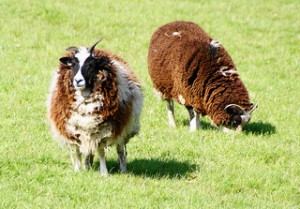
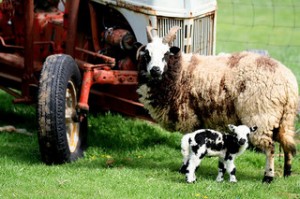
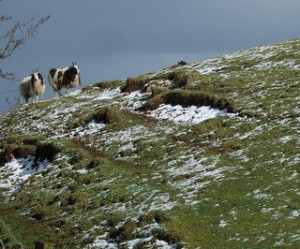
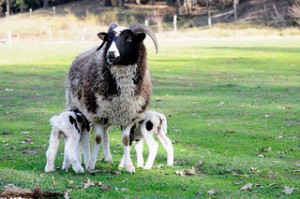
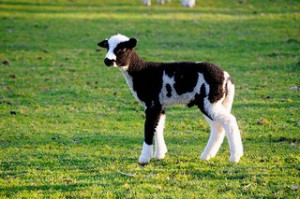










Very interesting history!
agreed 🙂
Thank you for giving credit to my photos… and thank you for featuring the Jacob sheep! 🙂
Of course, I don’t have any sheep to take picture of. I always give credit where it is due 🙂 I love playing with different fibers every week. I quite enjoyed spinning up some Jacob.
Love the fact that they can have so many horns! And love the multicolored coats.
Hazel